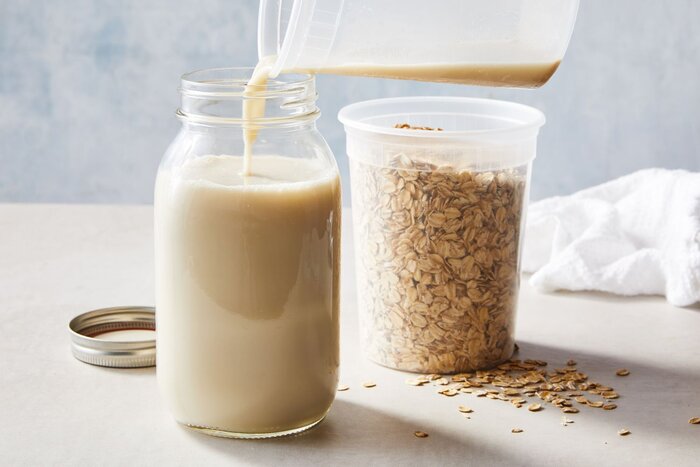Oat Milk Nutrition: Understanding the Facts About Calories, Protein, Fat, Carbs, and Vitamins
If you’re looking for a dairy-free and plant-based milk alternative, oat milk may be a great option for you. Not only is it creamy and delicious, but it’s also packed with nutrients. In this article, we’ll dive into the nutrition facts of oat milk, including its calories, protein, fat, carbs, and vitamins.
What is Oat Milk?

https://thenutritionfacts.com/storage/files/6/blogs/rsz_oat-milk-ft-recipe0520-1-df125462d2ac4a9b81ddf49ff56b4a08.jpgOat milk is a type of plant-based milk made from whole oat grains and water. It has a creamy texture and a slightly sweet taste, making it a popular choice for coffee and cereal. Oat milk is also a great alternative for people who are lactose intolerant or have a dairy allergy.
Calories in Oat Milk
One cup of oat milk (240 ml) contains around 130 calories, which is slightly higher than skim milk (80 calories per cup) but lower than whole milk (150 calories per cup). However, it’s important to note that not all oat milk brands are created equal. Some brands may have added sugar or oils, which can increase the calorie content. Be sure to check the label before purchasing.
Protein in Oat Milk
Compared to cow’s milk, oat milk contains less protein. One cup of oat milk contains around 3-4 grams of protein, while cow’s milk has 8 grams of protein per cup. However, oat milk is still a good source of plant-based protein and can be easily incorporated into a balanced diet.
Fat in Oat Milk
Oat milk is naturally low in fat, with around 2.5 grams of fat per cup. This is significantly lower than whole milk, which has around 8 grams of fat per cup. However, some oat milk brands may add oils to improve the texture and taste, which can increase the fat content.
Carbs in Oat Milk
Oat milk is a good source of complex carbohydrates, with around 16-20 grams of carbs per cup. However, it’s important to note that some brands may add sweeteners or thickeners, which can increase the carb content. Be sure to check the label before purchasing.
Vitamins in Oat Milk
Oat milk is fortified with vitamins and minerals to make it a well-rounded alternative to cow’s milk. One cup of oat milk typically contains around 10% of your daily recommended intake of vitamin A, 25% of your daily recommended intake of vitamin D, and 50% of your daily recommended intake of vitamin B12. Some brands may also add calcium and vitamin C to their oat milk.
Benefits of Oat Milk
Besides being a great dairy-free alternative, oat milk has several health benefits. It’s high in fiber, which can help with digestion and keep you feeling full for longer. Oat milk is also a good source of iron and magnesium, which are important for overall health and wellbeing.
Is Oat Milk Actually Good For You
Yes, oat milk is good for you! It is a nutritious and delicious plant-based milk alternative that is becoming increasingly popular. Oat milk is rich in fiber, vitamins, and minerals, making it a great addition to a balanced diet. Additionally, oat milk is a good option for people who are lactose intolerant or have a dairy allergy, as it is dairy-free. Just be sure to check the label for added sugars or oils, and opt for a brand that is fortified with vitamins and minerals.
Oat milk is a delicious and nutritious alternative to cow’s milk. It’s a great option for people who are lactose intolerant or have a dairy allergy, and it’s packed with nutrients like fiber, iron, and magnesium. When choosing oat milk, be sure to check the label for added sugars or oils, and opt for a brand that’s fortified with vitamins and minerals.